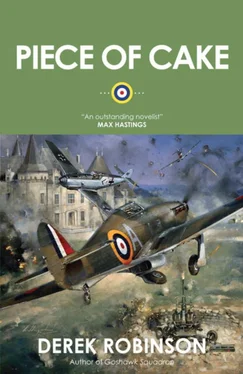He paused for breath. The pilots frowned, or gazed at the ground. The adjutant sucked his teeth and thought about bacon.
“This squadron is incompetent,” the Ram said. “It cannot fly straight, it cannot navigate efficiently, it does not know its battle tactics, and its aerial gunnery is a waste of good bullets. You are not fighter pilots. You are a cheap, dishonest imitation of fighter pilots. This state of affairs will change, with effect from now. You will do one of two things extremely rapidly: you will get better, or you will get out. That is not a threat…”
The adjutant cocked his head. He thought he had heard the sound of horses’ hooves.
“…nor is it a warning. That is a statement of fact. I estimate that within seven days half of you will have been chopped. Always assuming the Luftwaffe does not get here first and perform the eliminating for me…”
The adjutant strolled to one side and listened. Yes, definitely horses’ hooves. Odd.
“…which I can tell you seems more and more likely with every passing hour. You can also take it from me—”
Two large and shaggy farm-horses cantered around the corner, their broad hooves kicking up pebbles. Cattermole and Stickwell rode one, Patterson and Cox the other. The horses wore rope bridles, with the pilots’ neckties fastened to them as reins. Cattermole whooped, huskily: he had been whooping a lot; it kept the horse going. Patterson saw the pilots and waved. “You’re saved!” he shouted. “The cavalry’s here!” Then he saw the Ram. “Oh my Christ,” he muttered.
An RAF police corporal came after them on a bicycle, pedaling hard. The horses circled the group of pilots, gradually losing speed. The corporal halted, dismounted, saluted. “Very sorry, sir,” he said, breathing fast. “Couldn’t stop them, sir. Jumped the barrier, sir. Broke the pole, sir.”
The Ram nodded.
“Stop, blast you, stop,” Cox said bitterly to his horse. The animals were down to a trot. “Let me off, damn it.”
“Cowboys,” the Ram said bleakly.
Stickwell slid backward over his horse’s rump and fell to the ground. It was a long way to fall and he was slow to get up. “God, I’m thirsty,” he moaned, and realized that it was the wrong thing to say.
“Cowboys,” the Ram repeated. “Heading for the last round-up, no doubt.”
The horses finally stopped. Patterson and Cox got off. As Cattermole tried to dismount, his horse shook itself and Cattermole went sprawling on his hands and knees. All four men looked bleary, hung-over and stained.
“You seem to have had a busy night,” the Ram said. “You seem a trifle fatigued. We can’t have that. I know just the thing to buck you up. Squadron battle climb. Take off in twenty minutes.” He grinned, briefly, stretching his mouth like someone testing a rubber band, and walked away. Kellaway went with him. “B” flight waited a moment to let them get ahead and then followed.
Fanny Barton went over to Cattermole, still on his hands and knees, and kicked him. “Get bloody up,” he said. “Where the hell have you been?”
“It wasn’t my fault, Fanny,” Mother Cox told him. “I’ve been trying to get them home for hours. Honestly.”
“Crawler,” Patterson said.
Cattermole heaved himself up. “What’s going on, Fanny?” he asked. “Has Hitler declared war?”
“No. But the Ram has, and he’s looking for pilots to chop, so you four must be top of his list, wouldn’t you say? What the blue blazes have you been up to?”
Stickwell scratched his head, and discovered some straw. “Car broke down,” he said.
“Want to buy a nice horse?” Cattermole inquired.
Barton kicked him again, but Cattermole was already so bruised by events that he merely blinked. “Corporal, put those horses somewhere safe,” Barton ordered. He gave Cattermole an angry push. “Go and soak your heads, all of you,” he said.
“I can’t possibly fly,” Stickwell announced, “not in my condition.”
“Then get up there and crash,” Barton told him. “And make a bloody good job of it.” He shoved Stickwell, who collided with Patterson. “Run!” he shouted. They began a shambling trot, which got faster as Barton threw stones at them.
For fifty yards behind the Hurricanes the grass was flattened by the wash from their propellers.
Hornet squadron, twelve-strong, was drawn up in the arrowhead formation that the Ram favored for battle climb. Each section of three aircraft formed a V. The Ram, being squadron leader, was at the point of the leading section. Two of the other sections positioned themselves to right and left so as to form a larger V, while the fourth section was tucked in behind. Kingsmere had no runways. Once the squadron was formed-up and heading into the wind it was ready for takeoff.
The Ram glanced left and right to make sure everyone was watching him. The control tower had given them clearance. No Battles were wandering in or out of the aerodrome. He checked his watch: nineteen minutes since he gave the order. Not bad. The ground crews had been on duty already, so warming-up the planes had been quite straightforward; nevertheless the pilots must have got themselves kitted out and plugged-in and taxied-out and formed-up in double-quick time. Showed what they could do when they took their fingers out. He released his brakes and eased the throttle open.
Standing on the edge of the field, Kellaway and Dicky Starr watched the squadron start to roll. Dicky was reserve pilot that day; and when the trembling thunder of engines suddenly magnified to an aggressive, ear-battering bellow, he couldn’t keep still. He walked and skipped a few paces, his fists clenched in encouragement. The Hurricanes bounced and rocked as they gained speed; stray leaves and bits of paper and old grass cuttings got hurled into the air. When the Hurricanes’ tails came up, smoothly and quickly, it was as if large weights had slipped off them. Simultaneously the engine-notes altered, booming bigger and harder now that the wings were cutting the air more cleanly. Dicky Starr watched, and flew with them in his imagination: left hand on the throttle (keep her speed up), right hand on the control column (keep her nose up), feet hooked into the rudder-pedal stirrups (hold her straight), eyes, ears and backside acutely aware of the shape of the formation all around, of the health of the engine in front, of the racing judder of the wheels beneath.
The Ram’s Hurricane detached itself from the ground first. As it skimmed the grass the others lifted themselves. Within seconds their wheels were folding inwards and the squadron was climbing hard. The thunder faded to a soft roar, the roar to a growl. The planes diminished to a bundle of dots, which merged into one large speck and was lost to sight.
“Dicky, d’you know anything about rugger?” Kellaway asked.
“Not much.” Starr was cautious. “Damn-all, really. They have scrums and things, don’t they? And the ball always bounces the wrong way. Why?”
“The Ram’s told me to fix up a game against the Battle boys later on this morning. I’m just wondering—”
“Rugger? Us? Against them?”
“Why not?”
“Well…” For a moment Starr didn’t know where to start. “It’s Sunday,” he said. “Nobody plays rugger on Sunday.”
“Evidently the Ram does. He’s already had a word with their CO. His chaps are quite enthusiastic.”
“I bet they are. Have you seen them? They’re gorillas. They’ll murder us, adj.”
“Nonsense. They’re a jolly decent bunch. Anyway, the Ram reckons you all need a bit of toughening-up. He thinks you’ve been having it too easy.”
“They’ll kill us,” Starr said gloomily. “They’re maniacs. Anyone who flies a Battle must be loopy. That’s how they get picked. If you can think, and feel pain, they won’t have you.” He brightened up. “Anyway, we’re bound to get put on readiness again, so rugger’s out of the question, isn’t it?”
Читать дальше












